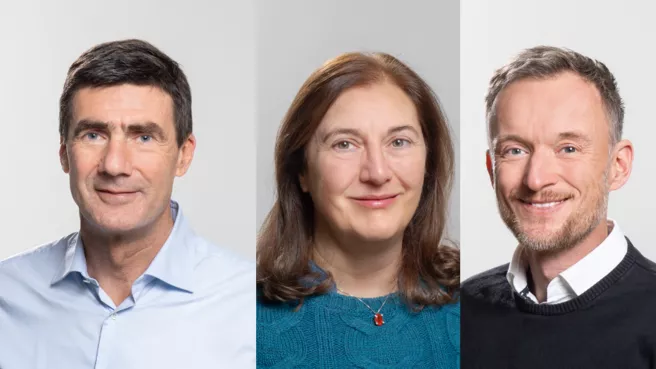Prof. Dr. Thorsten Bach (ERC Advanced Grant)
Active pharmaceutical ingredients are often composed of chiral organic compounds. That means that they consist of molecules, known as enantiomers, that are mirror images, but cannot be superimposed one upon the other. In pharmaceutical applications, this difference may result in one enantiomer tending to heal a patient, while the other causes side effects. Until now, considerable effort was needed to separate the undesired molecules from the mixture containing both enantiomers – the racemate – because it was not possible to transform the mixture into the desired final product. This is the starting point of the CALIDE project, headed by Prof. Thorsten Bach. Based on successful preliminary work, photochemical reactions will be used to convert the racemate of an organic compound into the desired enantiomer.
Prof. Thorsten Bach holds the Chair of Organic Chemistry I. He was awarded an ERC Advanced Grant in 2015 and received the Gottfried Wilhelm Leibniz Prize in 2020.
Prof. Dr. Nora Brambilla (ERC Advanced Grant)
Quarks are the elementary constituents of matter. The properties and interaction of quarks and gluons, which are the carriers of the strong force, are of paramount importance in the quest to understand the behavior of matter at the most fundamental level. The strong force is unique among the four forces of nature for displaying the phenomenon of confinement in the low energy region, making its study particularly challenging. For a long time, quarks were observed to combine in hadrons only as quark-antiquark (mesons, like the pion) or in group of three (baryons, like protons and neutrons that make up the atomic nuclei). In the last two decades new exotic hadrons, called XYZ, have been discovered at particle accelerator experiments around the world. They display striking and unexpected characteristics and their composition in terms of quarks and gluons is still unclear. The research project “EFT-XYZ” by Prof. Nora Brambilla aims at investigating these new forms of matter. With an unprecedented combination of quantum effective field theories and massive computer simulations this research will produce a breakthrough in our ability to calculate the XYZ properties in vacuum and in medium, granting new insight on the fundamental strong force.
Prof. Nora Brambilla is head of the "Theoretical Particle and Nuclear Physics" group at the TUM School of Natural Sciences and founder of the TUMQCD Lattice Collaboration. Prof. Brambilla is a Member of the ORIGINS Cluster of Excellence.
Prof. Dr. Frank Pollmann (ERC Proof of Concept Grant)
Quantum computers can perform certain tasks more effectively than conventional classical computers. However, current quantum computers and probably also the models of the near future are still severely limited—for example by the loss of coherence due to the coupling with the environment and also by the limited number of "qubits". In order to be able to use these quantum computers despite those limitations, algorithms are required that are specifically designed for the respective platform. With the QTEngine project, Frank Pollmann will create a “quantum tensor network” based software package that forms the basis for the development of, e.g., quantum simulations and quantum machine learning, regardless of the computer used. The aim is to make it easier for researchers and commercial developers to work with quantum computers.
Frank Pollmann is Professor of Theoretical Solid State Physics at TUM. The ERC has already funded his research with a Consolidator Grant. He is a member of the MCQST Cluster of Excellence.
Original Article: https://www.tum.de/en/news-and-events/all-news/press-releases/details/three-erc-advanced-grants-for-tum-researchers
Corporate Communications Center
- Paul Hellmich / Julia Rinner / Magdalena Eisenmann
- paul.hellmich@tum.de
- presse@tum.de
- Teamwebsite
